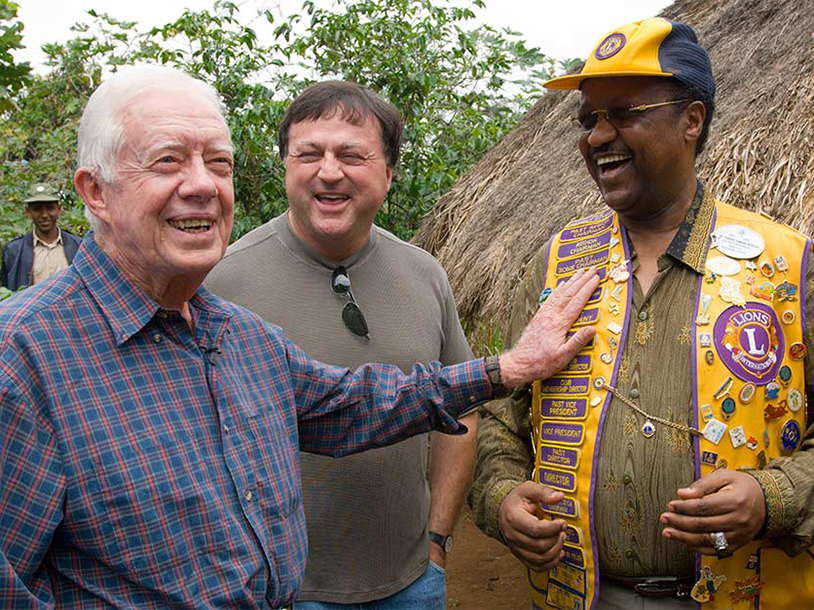
January 2023
Under the leadership of former First Lady Rosalynn Carter, The Carter Center launched the Mental Health Program in 1991 as part of ongoing efforts to promote awareness, reduce stigma, and inform policy on mental health and mental health care. In 1996, the Center established the Rosalynn Carter Fellowships for Mental Health Journalism (RCJF), coinciding with the breakthrough passage of the Mental Health Parity Act, the first legislation to require that certain insurance providers cover mental health benefits on par with medical or surgical benefits.
Even after the Mental Health Equity and Substance Abuse Parity Act passed in 2008, expanding the reach of the 1996 legislation, and then the Affordable Care Act in 2010, parity between mental health care and medical health care remains far from achieved. Millions of people struggle to find, receive, and afford appropriate quality mental health treatment and, as a result, are forced to pay out-of-network costs or not receive care at all.
Mental Health Parity Collaborative
In February 2022, The Carter Center convened and launched the Mental Health Parity Collaborative, a multistate collaborative of newsrooms across the U.S. created to improve news coverage of mental health care and parity through an investigative and solutions-based journalism lens. Journalistic collaboratives enable newsrooms to share resources and ideas, reach a larger audience, and effect more meaningful change—including legislative action.
Newsroom partners have been based in six key states—Arizona, California, Georgia, Illinois, Pennsylvania, and Texas—along with a national partnership with The Center for Public Integrity (CPI), a renowned investigative reporting outlet in Washington, D.C. Harvard University’s Shorenstein Center on Media, Politics, and Public Policy has provided additional support. Through a team-oriented process, collaborative partners, which include more than 40 reporters and editors, are producing a body of stories on mental health parity that are both data- and source-driven to illuminate the challenges and possibilities for improvement. To date, the initial project cohort has published more than 30 stories, which include long-form investigative and short-form news articles, radio broadcasts, podcasts, photography, and mixed media. In 2023, the collaborative will expand to include additional states and news outlets.
New Partnership with the Brain & Behavior Research Foundation
In October 2022, the Brain & Behavior Research Foundation pledged its generous support to the Center’s Mental Health Parity Newsroom Collaborative and the Rosalynn Carter Fellowships for Mental Health Journalism. The Brain & Behavior Research Foundation (BBRF) is an international nonprofit based in New York City that supports scientific research to better understand and treat mental illnesses. For more than 30 years, it has funded innovative research in neuroscience and psychiatry as a means to develop better treatments, cures and methods of prevention for psychiatric illnesses and ultimately, lessen the suffering of those living with them.
The generous gift from BBRF brings to fruition a partnership that has been decades in the making. Dr. Herb Pardes is the former director of the National Institute of Mental Health (NIMH) and the founding president of Brain & Behavior Research Foundation’s Scientific Council, an all-volunteer, world-renowned board of brain and behavioral experts who review and select innovative research for BBRF to fund. He also worked alongside former First Lady Rosalynn Carter in the early days of her mental health advocacy work. To this day, he holds much respect and admiration for her and her legacy. This connection came full circle in early 2022 when Carter Center staff met with BBRF leadership to discuss a partnership.
Through its new partnership with The Carter Center, the Brain & Behavior Research Foundation will sponsor a Brain & Behavior Research Foundation Fellow for each year with a specific purpose: to report on cutting-edge research in behavioral health. The foundation has also committed to funding a year of the parity collaborative.
Additionally, the Brain & Behavior Research Foundation hopes to assist the Center’s Mental Health Program in ways above and beyond funding. BBRF plans to make its Scientific Council members available to the RCJF Fellows and parity collaborative reporters to give them access to cutting-edge research and knowledge about mental health issues.
In a meeting with Carter Center staff, Dr. Borenstein said: “Science helps combat the stigma. If we can get journalists to speak about the science [behind mental health challenges] and help the public to understand it scientifically, we’ll fight the stigma.”
The new partnership between The Carter Center and the Brain & Behavior Research Foundation aims to do just that. The Carter Center and BBRF share the belief that journalism plays a critical role in shaping how people think about and respond to mental health issues. Better informed mental health reporting can decrease stigma and discrimination, encourage people to seek treatment, and positively impact related policies and support.
The Carter Center is grateful for this new partnership, which will help bring breakthrough research in mental health to broader audiences, improve access to mental health services, and reduce stigma associated with mental illness and chemical dependency.
Learn more about the Brain & Behavior Research Foundation »
Please sign up below for important news about the work of The Carter Center and special event invitations.

Browse our archive of Carter Center featured partners »